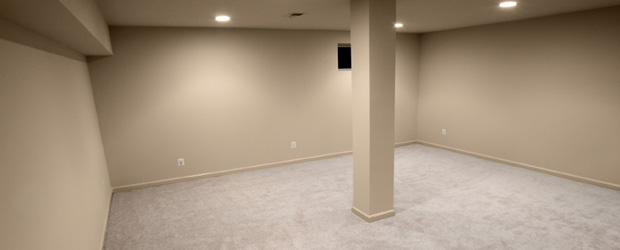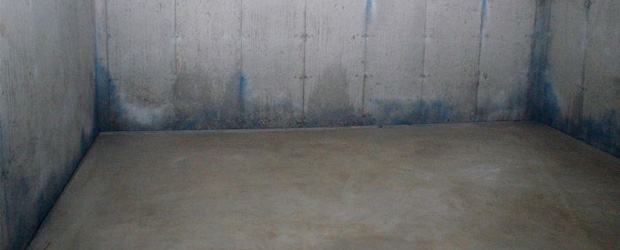Basements are often the most vulnerable areas of a home when it comes to moisture-related issues. Due to their location below ground level, basements tend to have poor ventilation and insulation. This can lead to the build-up of condensation. This moisture can eventually cause dampness, mould growth, and structural damage to your concrete floor. Whether you’re dealing with a new basement or trying to remedy an older, moisture-prone space – waterproofing your concrete basement floor is essential. In this comprehensive guide, we’ll walk you through the steps to effectively waterproof your basement floor and protect your home or business from potential damage from damp in below-ground structures.

The Importance of Waterproofing Your Basement Floor
Waterproofing a basement floor is not just about preventing leaks; it’s about creating a long-lasting, moisture-resistant barrier that safeguards your home’s foundation. When moisture penetrates a concrete floor, it can lead to a host of problems, including:
- Mould and Mildew Growth: Excess moisture creates the perfect environment for mould and mildew, which can cause health issues and unpleasant odours.
- Structural Damage: Over time, water can weaken concrete, leading to cracks and compromising the structural integrity of your basement.
- Damage to Flooring Materials: If you plan to install flooring materials such as carpet, vinyl, or tile, moisture can cause these materials to warp, rot, or detach from the concrete surface.
- Increased Energy Costs: A damp basement can lead to higher humidity levels throughout your home, making it harder to heat and cool, which increases energy costs.
By properly waterproofing your basement floor, you not only protect the space itself but also enhance the overall durability and value of your home.
Understanding the Sources of Moisture
Before diving into the waterproofing process, it’s crucial to understand the sources of moisture that can affect your basement. These include:
- Groundwater Seepage: Water from the surrounding soil can seep through cracks in the foundation or floor, especially during heavy rainfall or when the water table rises.
- Condensation: Poor ventilation in basements can lead to condensation, particularly in areas where warm air meets cold surfaces like concrete floors.
- Leaks from Above: Water from leaks in plumbing or upper floors can trickle down and accumulate in the basement, exacerbating moisture problems.
Identifying the source of moisture is the first step in choosing the right waterproofing method for your basement floor.
Surface Protection: The First Line of Defence
One of the most effective ways to protect your basement floor is by applying a surface coating that prevents moisture from penetrating the concrete. Many find their basements looking older much quicker than the rest of the building, because they leave the surface untreated. This is especially important if you plan to install other types of flooring on top of the concrete. If you don’t look after your flooring it won’t last very long. Even if you’re planning on laying down carpet, vinyl or another material – you need to shield the surface.
We suggest you use Coo-Var’s Damp Shield product. This is a two-part epoxy resin coating designed to prevent moisture from rising and penetrating your concrete floor. Moisture can cause you serious issues in the future so this is an important step to waterproofing a basement floor.

Tanking: Creating a Waterproof Barrier
Tanking is another highly effective method for waterproofing a basement floor. This process involves applying a waterproof barrier that prevents water from penetrating the concrete.
Understanding Tanking
Tanking involves applying a slurry coating to both the walls and floors of your basement. This creates a continuous waterproof barrier that blocks moisture from entering the space. It’s a method commonly used in both residential and commercial properties to combat groundwater infiltration.
Using Sika Damp-Proofing Slurry
Another great way to waterproof your basement is to use a product which when mixed creates a slurry. This slurry mix can then be used to coat wall and floor surfaces. Sika Damp-Proofing Slurry is low odour product that is easy to use and BBA approved. When mixed with water this coating can be directly applied to many surfaces – like your basement floor!
This product is designed for jobs such as tanking residential or commercial products. If you’re not an expert on basements, don’t worry – Rawlins are! Tanking means to install a barrier on your underground surfaces to keep ground water at bay and the inside dry. You can do this on your interior or from your exterior wall, creating a waterproof barrier between your surface and the moisture.
We like this Sika slurry solution because it’s extremely easy to use. It really protects your basement floor from being penetrated by water.

Preventing Future Moisture Problems
A basement can be tricky to manage, so your best solution is to make sure it’s protected at the time of installation. If you’re not fortunate enough to do so, make sure you regularly check for signs of condensation and use the right product.
While waterproofing your basement floor is crucial, it’s also important to take additional steps to prevent future moisture issues. Here are some tips to help maintain a dry and healthy basement environment:
- Improve Ventilation: Ensure that your basement has adequate ventilation to reduce condensation. Installing exhaust fans or dehumidifiers can help maintain proper humidity levels.
- Repair Foundation Cracks: Regularly inspect your basement for any cracks in the walls or floor and repair them immediately to prevent water from entering.
- Maintain Gutters and Downspouts: Ensure that your home’s gutters and downspouts are clean and directing water away from the foundation. This helps prevent water from pooling around the basement.
- Install a Sump Pump: If your basement is particularly prone to flooding, consider installing a sump pump to remove excess water and prevent it from accumulating.
By combining waterproofing techniques with regular maintenance, you can significantly reduce the risk of moisture damage and extend the life of your basement.
When to Call the Professionals
While many homeowners can handle basic waterproofing and tanking tasks themselves, there are situations where it’s best to consult with a professional. Consider reaching out to an expert if:
- You’re dealing with severe water infiltration: If your basement frequently floods or you notice significant water seepage, professional intervention is necessary to address the root cause.
- You’re unsure of the best waterproofing method: If you’re uncertain about which products or techniques to use, Rawlins expert Technical Team can provide tailored recommendations based on your specific situation.
- You’ve tried DIY solutions without success: If previous attempts to waterproof your basement have failed, a professional can diagnose the issue and implement a more effective solution.
Professional waterproofing contractors have the experience and tools to address even the most challenging moisture problems. They help ensure your basement stays dry and safe.
Not sure how to go about waterproofing your concrete basement store? Leave a comment below for our experts to review.
Posted: 29th June 2015 | Updated: 10th September 2024
 Rawlins Paints Blog Industrial Paint Tips, Guidelines & DIY Articles
Rawlins Paints Blog Industrial Paint Tips, Guidelines & DIY Articles
Hi we have a concrete summerhouse which we inherited that we want to make into a usable office space – having taken up the lino on the floor which was soaking we found concrete and no damp course or waterproof membrane. it smells of damp. what is the best solution to waterproof the floor – we are thinking of putting underfloor heating down aswell and then a laminate floor on top – is this going to work? We know we will need to insulate the walls and the ceiling aswell. It already has 2 double glazed windows but no ventilation vents. It has electricity and lighting installed.
any advice would be appreciated.
Many thanks
Charlotte
Good afternoon Charlotte,
The product you’d need to deal with the damp situation you are having with the concrete floor is Coo-Var Damp Shield. It will stop any damp problems coming through when you have the laminate flooring installed, too.
Best regards.
Mark
Hi I need to seal a porous concrete parking bay and then need to cover it with a waterproof covering. Need something to withhold the weight of my car. Please recommend any of your products that can do the job.
Hi Paramjit,
Thank you for your question. If you were planning on applying a coating and then putting something else over the top such as concrete slabs, we would recommend Remmers MB 2K.
If that is not the case and it is to be a surface applied coating system then we would recommend Eagle Desmopol Waterproofing Roofing Kits 15 Year Guarantee and would also recommend the additional Anti-Slip Slate Grit be applied to provide a slip resistant surface – this would be suitable for a vehicle being parked on it.
I hope this helps and please feel free to get in touch if you have any further questions.
Many thanks
Stuart
Hi there. I came across this article because we are remediating for mold (a costly process!). We had to demo the kitchen floor (laminate tile) and we are having the concrete repoured, and then polished. To prevent further mold, do we have the contractor apply a damp sealer to the concrete mix? We are trying to avoid the waterproofing paint on top of concrete if possible. Thank you!
Hi Vanessa,
Thank you very much for reading our blog and for your question.
Unfortunately we wouldn’t be able to assist in this instance – we would advise speaking with the contractor who is applying the new screed for you in this case.
Apologies we weren’t able to help this time, and thank you again.
Many thanks
Stuart